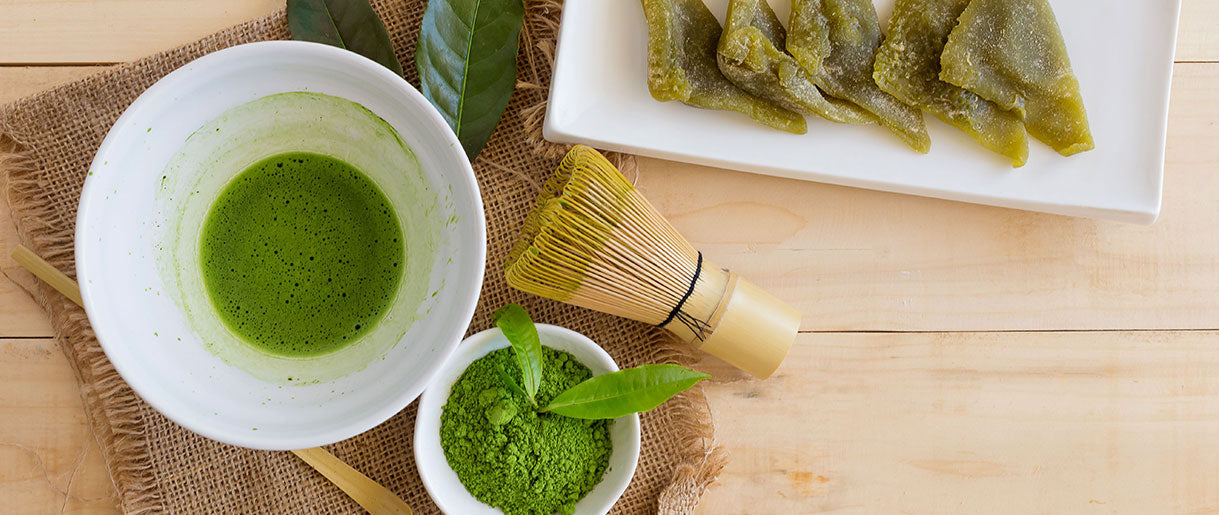Green tea has been a beloved beverage for centuries, known for its soothing aroma and myriad health benefits. But did you know that it might also offer hope for those managing Attention Deficit Hyperactivity Disorder (ADHD)?
Studies suggest that certain compounds in green tea, like L-theanine, may help alleviate some ADHD symptoms by improving focus and reducing anxiety.
So, if you're curious about natural ways to support your ADHD journey, let's dive into the world of green tea and explore its potential benefits together. Join us as we uncover how this ancient brew could be a modern-day ally for focus and calm.
1. Enhances Focus

Ever found yourself mid-task, only to be derailed by a fleeting thought or external distraction?
For those navigating the waters of ADHD, this is a familiar scenario. Enter green tea, a beacon of hope in ADHD management, particularly renowned for its ability to sharpen focus and bolster concentration.
- L-Theanine, the Brain's Best Friend: This amino acid is a superstar in green tea. It's known for increasing alpha brain waves (1), crucial for calm alertness. Imagine it as your brain's tuning fork, harmonizing your thoughts to a frequency where they're focused yet relaxed.
- Caffeine, but Not as You Know It: Before you think caffeine equals jitters, hear us out. The caffeine in green tea pairs up with L-theanine in a unique caffeine combination, providing a gentle nudge to your cognitive performance without the typical crash and burn (2).
- Matcha Magic: If you're looking for a potent punch of these benefits, matcha green tea is your go-to. This powdered green tea isn't just a trendy café offering; it's a concentrated form of all the good stuff, potentially doubling down on those focus-enhancing properties.
While green tea isn't a magic potion, incorporating it as part of your broader ADHD treatment could significantly boost your daily cognitive function. So, consider inviting green tea into your morning ritual or an afternoon pick-me-up routine.
2. Reduces Anxiety

Navigating the day with ADHD can often feel like you're in a constant state of high alert, with anxiety looming around every corner.
But what if your daily cup of green tea could help smooth those rough edges? Beyond just perking up your focus, green tea might be a gentle warrior in the battle against ADHD-related anxiety (3).
- L-Theanine, the Calm in Your Cup: This powerful amino acid found in green tea leaves works wonders in promoting relaxation (4) without sedation. It's like having a mental health professional in your mug, helping to manage stress and reduce anxiety one sip at a time.
- Sipping Away Stress: Regularly drinking matcha or green tea could improve sleep quality and reduce stress. Imagine ending your day with a cup of matcha powder bliss, telling your anxieties to take a back seat as you embrace a night of restful sleep.
- Harmony of L-Theanine and Caffeine: While caffeine might seem counterintuitive for anxiety, the unique caffeine combination in green tea, paired with L-Theanine, promotes sustained attention and relaxation. It's a symphony of calm, subtly improving focus while keeping anxiety at bay.
The benefits of green tea for anxiety make it an effective solution for those dealing with ADHD. Adding this tea to a morning routine for ADHD could mean improved symptoms, allowing you to handle your daily tasks effectively.
3. Provides Cognitive Support
Ever considered that your journey to enhanced cognitive function might start with a simple leaf?
Green tea, a treasure trove of benefits for people with ADHD, isn't just about calming nerves or sharpening focus. It's also about naturally bolstering your brain function, offering a gentle nudge to your overall cognitive functions.
- L-Theanine: A Brain-Boosting Powerhouse: This amino acid isn't just about reducing stress; it's also linked to improved memory and attention. Research suggests (5) the effects of L-theanine go beyond a calming effect, providing a supportive boost to various cognitive functions.
While embarking on this green tea journey, remember that changes in body weight, dietary habits, or supplement intake should be navigated with care, especially when managing an ADHD diagnosis. Consult with healthcare professionals before making significant dietary or lifestyle changes.
How to Incorporate Green Tea into Your ADHD Routine

Integrating green tea into your daily routine could be a small step with significant benefits, especially for those with an ADHD diagnosis. It's not just about sipping a beverage; it's about embracing a habit that contributes positively to your executive functioning and overall well-being.
- Timing and Dosage: Start your day with a cup of green tea to awaken your senses and boost focus without the jitters. Aim for about 100-200 mg of L-theanine, which is typically found in 1-2 cups of green tea. Avoid consuming it too late in the day to prevent sleep disturbances.
- Variety is the Spice of Life: Both green and black tea come from the Camellia sinensis plant and contain the amino acid L-theanine. Switching between them can offer varying flavors and benefits. However, green tea generally has a higher concentration of L-theanine, making it a preferred choice for those seeking its calming and focusing effects.
- For the Young and Restless: If you're considering green tea for younger children with ADHD, it's crucial to adjust the dosage accordingly and consult a healthcare provider to ensure it's a safe and beneficial addition to their routine.
Incorporating green tea can be one of many lifestyle modifications you make post-ADHD diagnosis. Whether you're aiming to improve memory, reduce being easily distracted, or enhance overall paying attention skills, green tea can play a supportive role.
Remember, it's not a standalone cure but a supplement to a broader, balanced approach to managing ADHD. Embrace the positive effects of this ancient remedy as part of your daily journey towards better focus and calm.
FAQs About Green Tea for ADHD
Does Green Tea Increase Dopamine?
Yes, green tea can increase dopamine levels.
It contains an amino acid called L-theanine, which, along with its other benefits, has been shown to affect the brain's neurotransmitter system, thereby increasing dopamine levels and other mood-enhancing chemicals like serotonin (6) and GABA.
However, the effects can vary based on body chemistry and the amount of green tea consumed.
Can Green Tea Interact With ADHD Medications?
Yes, green tea can interact with ADHD medications. The caffeine in green tea may increase the side effects of stimulant medications commonly used for ADHD, such as increased heart rate and blood pressure.
Additionally, certain compounds in green tea might affect how the body metabolizes these medications, potentially altering their effectiveness. Individuals on ADHD medication need to consult with a healthcare professional before adding green tea to their routine.
How Much Green Tea Should Someone With ADHD Consume?
For someone with ADHD, it's generally recommended to consume about 1-2 cups of green tea daily, providing approximately 100-200 mg of L-theanine.
However, individual tolerance, especially to caffeine, varies, so it's essential to start with a lower amount and adjust as needed. Always consult a healthcare professional, particularly when combining with ADHD medications or other treatments.
Key Takeaways
In the tapestry of natural remedies, green tea emerges as a gentle yet potent ally in managing ADHD. It's not just a beverage; it's a centuries-old tradition steeped in health benefits, from enhancing focus to calming anxiety and boosting overall cognitive function.
As we've explored, the delicate leaves of the Camellia sinensis plant hold more than just flavor—they carry the potential to impact lives touched by ADHD positively.
But remember, while green tea offers promising benefits, it's part of a larger symphony of strategies for managing ADHD. It's about balance, understanding, and making informed choices that suit your unique needs.
Whether contemplating a cup of green tea in the morning or integrating it as a calming ritual, let it be a natural, supportive note in your daily rhythm.
We invite you to share your stories and experiences as you embark on this verdant path. Have you found a moment of focus or a whisper of calm in your cup?
Let's brew a conversation and spill the leaves of knowledge. Comment below and join the journey of discovery and connection.
References
- L-theanine, a natural constituent in tea, and its effect on mental state, (1), https://pubmed.ncbi.nlm.nih.gov/18296328/
- Anti-stress Effect of Green Tea with Lowered Caffeine on Humans: A Pilot Study, (2), https://pubmed.ncbi.nlm.nih.gov/28566632/
- The Effects of Green Tea Amino Acid L-Theanine Consumption on the Ability to Manage Stress and Anxiety Levels: a Systematic Review, (3), https://pubmed.ncbi.nlm.nih.gov/31758301/
- Improvement of Depressed Mood with Green Tea Intake, (4), https://www.mdpi.com/2072-6643/14/14/2949
- Effects of l-Theanine on Cognitive Function in Middle-Aged and Older Subjects: A Randomized Placebo-Controlled Study, (5), https://www.ncbi.nlm.nih.gov/pmc/articles/PMC8080935/
- A Novel Theanine Complex, Mg-L-Theanine Improves Sleep Quality via Regulating Brain Electrochemical Activity, (6), https://www.frontiersin.org/articles/10.3389/fnut.2022.874254/full










Let Us Know Your Comments